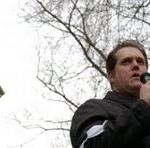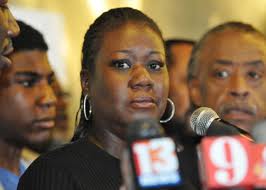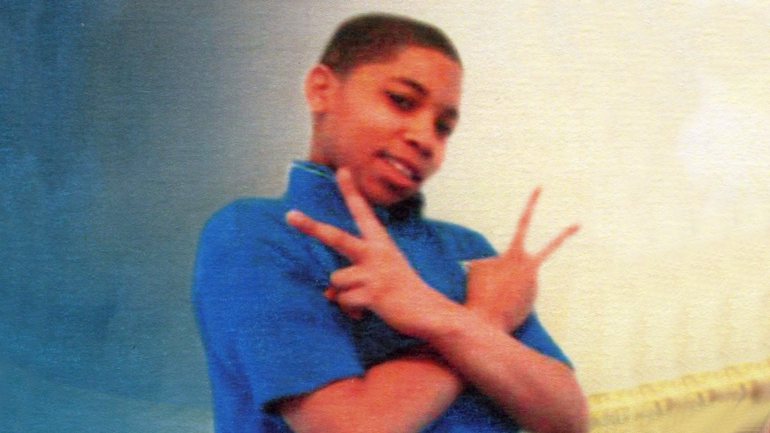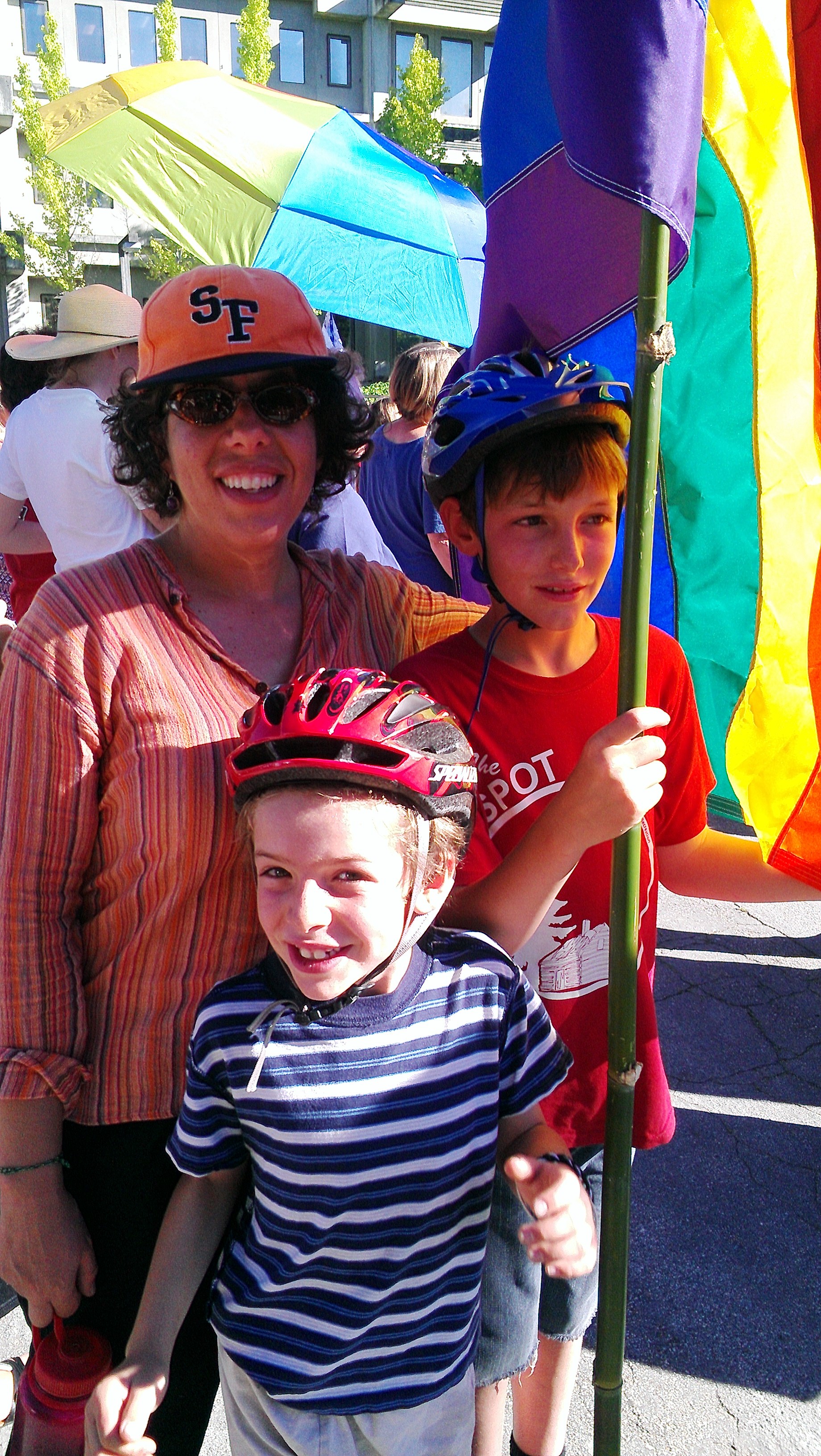In Conversation: On the Landmark SCOTUS Decisions, Single-Variable Politics and Movement Forward
Darnell: Tim, You have spoken and written publicly about the need—particularly on the part of white and economically privileged LGBT people—to resist hasty celebration of the DOMA decision, given the U.S. Supreme Court’s rulings on other landmark civil rights cases this week. Can you say a bit more about that, and the politics that you maintain as a white gay man, which influences your position?
Tim: The shortest answer to this question is that my activism was first inspired by movements for racial and socio-economic justice here in the United States, as well as the anti-apartheid struggle in South Africa, which was still raging when I entered college in the fall of 1989. Intellectually, I have been shaped most deeply by African-American Studies, Critical Race Theory, and Social and Cultural History, all of which were in full bloom when I was an undergraduate and graduate student during the 1990s. The praxis that sprang from this combination of activist and academic work has been the driving force behind almost everything I’ve done since that formative time. As a result, I maintain a fierce devotion to coalitional politics—to act in a way that crosses boundaries of difference and builds bridges of solidarity, as hard and frustrating as these things often are—anchored in a critical analysis of structural inequalities that stem from historical forms of discrimination based on color, class, and the like.
As a white man, I have always tried to interrogate and navigate my own privileges in as intentional a way as possible, which for me means four things: first, that my politics and analysis always begin with the question, “Who is left out?”; second, that I seize every opportunity to challenge prejudice and discrimination whenever I encounter it; third, that I use my privileges solely for the purpose of amplification and inclusion of those for whom representation and recognition is not so easy or welcome; and fourth, that I work collaboratively, which means that I try to listen more than I speak, follow more than I lead, and critique myself at least as much as I critique others. To be sure, I often fail, but when my time here is over, I want to be known as someone whose life was driven by good intentions in the direction of justice for all people.
Darnell: Yes, single-variable politics and movement work solely focused on one issue will always result in limited gains. The same-sex marriage equality movement, which is a necessary means to a particular end, is invested in securing equal protections under law for those LGBTQ adults who seek to marry, but what about those queer and trans* persons who do not wish to marry? What about the queer and trans* youth whose lives aren’t wholly considered in such an adult-centric and classed-based advocacy framework?
So many movement builders, like queer scholar/activists Lisa Duggan and Richard Kim (editors of a special edition of S&F Online titled “A New Queer Agenda”), have written about the danger of investing money and time in a limited movement that seeks to bring about equality for a select number of LGBTQ people. In the preface to that special edition, they argue that the process of “increasing lesbian and gay representation in dominant institutions” as a means of uplift of all queer people is a “trickle-down theory of gay rights.” But, too often, equality and equity do not “trickle down” to those who are multiply marginalized quick enough or at all.
We are missing an important lesson that black feminists have articulated and brought to bear on social justice movements. I am thinking, for example, of the need for us to attend to what the Combahee River Collective noted as the simultaneity (or Kimberlé Crenshaw named “intersectionality”) of race, gender, class, and other forms of oppression. In other words, we cannot at all begin to push forward a movement for sexual justice without ensuring that we stand against racism, patriarchy, sexism, violence against women, ableism, economic injustice, disproportionate criminalizing of people of color, and other forms of oppressions that wreak material and psychological havoc in the lives of the multiply marginalized. Single-variable politics is a politics of self-centeredness.
 Tim: With respect to the LGBT rights struggle, as a (white) gay man, I worry that the present incarnation of the movement—its priorities, its voice, its “agenda”—is far too limited in scope, more assimilationist than liberationist, disproportionately led and financed by folks who look like me. And I worry, even more, about what you describe as “single-variable politics,” the tendency to work for and celebrate what benefits one group or issue, while remaining blind to other—in my view, interrelated—struggles for freedom and equality. When I see so many gay and lesbian folks (many of them white and well-to-do) celebrating Wednesday’s SCOTUS rulings on DOMA and Prop 8 without loudly commenting on and boldly critiquing Monday’s troubling ruling on affirmative action and Tuesday’s devastating ruling on the Voting Rights Act, these concerns are only reinforced. Of course we all should celebrate advances in civil rights, even when they are limited, as was the case here, but our celebrations must always be tempered by the harsh reality that we still have a long way to go before any of us reaches the Promised Land. As I’ve long argued, we live in an age of many paradoxes when it comes to “progress.” Let’s not add to this by only being able to see justice in the mirror.
Tim: With respect to the LGBT rights struggle, as a (white) gay man, I worry that the present incarnation of the movement—its priorities, its voice, its “agenda”—is far too limited in scope, more assimilationist than liberationist, disproportionately led and financed by folks who look like me. And I worry, even more, about what you describe as “single-variable politics,” the tendency to work for and celebrate what benefits one group or issue, while remaining blind to other—in my view, interrelated—struggles for freedom and equality. When I see so many gay and lesbian folks (many of them white and well-to-do) celebrating Wednesday’s SCOTUS rulings on DOMA and Prop 8 without loudly commenting on and boldly critiquing Monday’s troubling ruling on affirmative action and Tuesday’s devastating ruling on the Voting Rights Act, these concerns are only reinforced. Of course we all should celebrate advances in civil rights, even when they are limited, as was the case here, but our celebrations must always be tempered by the harsh reality that we still have a long way to go before any of us reaches the Promised Land. As I’ve long argued, we live in an age of many paradoxes when it comes to “progress.” Let’s not add to this by only being able to see justice in the mirror.
In recent years, though, public opinion on LGBTQ rights has shifted noticeably, even dramatically, in favor of support for things like hate crimes laws, anti-bullying policies, the repeal of “Don’t Ask, Don’t Tell,” and marriage equality. Yet simultaneously, we also see a growing sense among many Americans, especially but not exclusively white Americans, that we have moved into a different era in terms of “race relations,” that we have “overcome” older forms of racial subordination and discrimination, and that we no longer need race-based affirmative action, protections against racial discrimination in voting, and the like. Some have even advanced the claim–specious to me–that “gay is the new black.” How do we make sense of these shifts in politics and culture in a way that both acknowledges our different histories of oppression and yet recognizes, as Dr. King said, that “injustice anywhere is a threat to justice everywhere”?
Darnell: I was most alarmed and infuriated because of the insistence on the part of some of the justices, who concurred during both the VRA case and the affirmative action case, that we have achieved “racial progress.” To claim that we have done away with white racism and the insidious ways white racism informs and organizes institutions, systems, and legislation is to outright deny the lived experiences of black and brown folk in this country.
How dare the Justices–including the lone black Justice Thomas–rely on fiction to rule in cases that will result in material consequences in the lives of black and brown folk in a country that holds more bodies than any other in its prisons (the majority of those bodies are non-white); a country where 27.4 percent of blacks and 26.6 percent of Hispanics were poor, compared to 9.9 percent of non-Hispanic whites and 12.1 percent of Asians in 2010 according to National Poverty Center data; where the horrific mass killings of white people are still afforded media coverage and compassion while the mass killings of black and brown people continue to be read as mundane; where blacks continue to be disproportionately impacted by HIV; etc.
Some name the the election of President Obama as evidence that we have overcome the haunting presence of our racist past. But if the election of Obama is our measure of progress, then progress would need to be redefined as a forwarding of stale racist ideologies into our present. One only needs to recall the many conspicuous and inconspicuous racist responses to the very election that we deem as the test case for the destruction of the racial ceiling. The logic of post-raciality is comedic. And that we now lift up a progressive gay rights agenda as a sign of justice against state heterosexism is but another move to cover over other isms that continue to negatively impact black and brown heterosexual and LGBT people.
You study the history of social movements, with particular attention given to the black civil rights movement in the United States. Given your research, what are your thoughts about the notion of “racial progress” as evinced by some of the Supreme Court justices as a rationale for their decisions?
 Tim: There is nothing—nothing—that roils me more than the fictional claim, ascendant in these times, that America has achieved some kind of “post-racial” state, or that we have, as a nation, moved beyond having to worry too much about race matters or racist realities. As long as we can still celebrate the “historic election” of “America’s first black President”—or the “first black” anything, for that matter—we should know that we have a lot more work to do in this regard. One need look no further than our prisons and our schools to understand this in the clearest, starkest of terms. At this moment in American history, it’s very important to remind ourselves that the Voting Rights Act of 1965—the most important provision of which was essentially gutted on Tuesday—was enacted as a long overdue remedy after a century of segregationist violations of the Reconstruction Amendments added to the U.S. Constitution in the wake of slavery’s abolition after the Civil War.
Tim: There is nothing—nothing—that roils me more than the fictional claim, ascendant in these times, that America has achieved some kind of “post-racial” state, or that we have, as a nation, moved beyond having to worry too much about race matters or racist realities. As long as we can still celebrate the “historic election” of “America’s first black President”—or the “first black” anything, for that matter—we should know that we have a lot more work to do in this regard. One need look no further than our prisons and our schools to understand this in the clearest, starkest of terms. At this moment in American history, it’s very important to remind ourselves that the Voting Rights Act of 1965—the most important provision of which was essentially gutted on Tuesday—was enacted as a long overdue remedy after a century of segregationist violations of the Reconstruction Amendments added to the U.S. Constitution in the wake of slavery’s abolition after the Civil War.
Indeed, one need look no further than the 2012 Presidential election—with all the GOP-led attempts to limit the voting rights of people of color in a trifling and thinly veiled effort to ensure that Barack Obama would only be a “one-term President”—to know that our racial woes, insofar as voting rights and so much else are concerned, are hardly history. In fact, there is an important cautionary lesson for LGBT folks in this week’s SCOTUS rulings on affirmative action and voting rights: progress is never inevitable or absolute. Victories achieved can always become dreams deferred, and “historic” advances sometimes result in devastating setbacks. This is another thing I’ve learned from black people, from African-American history, and from the troubling tango that animates our always difficult dance of democracy.
Darnell: It is easy to be overwhelmed with senses of defeat and wariness in light of this week’s events. We are confronted with media covering the Zimmerman case, the most recent movements on the part of Republican-dominated states–as you’ve noted–to quickly put in place restrictive voting laws in the immediate aftermath of Tuesday’s SCOTUS decision on the Voting Rights Act, and so much else. Yet, we’ve also witnessed the diligence of leaders like Texas State Senator Wendy Davis, and have been reminded that we, the people, still have power. What strategies do you think we should use to undo the disastrous doings of the Supreme Court and their subsequent impact at the state and local levels?
Tim: With respect to the Zimmerman trial for the murder of Trayvon Martin, I just can’t. As someone who helped raise a young black man—who often walked to my apartment at night after practice in high school in a “hoodie”—this trial hits very close to home. And of course, every black parent and person I know feels this in their bones; I wish more white folks did. As we’ve seen time and again—and I know I don’t need to tell you this—race and racism are too often matters of life and death in America. That said, we must find hope wherever it resides. Trayvon Martin’s parents—and other parents who have suffered similar violence in obscurity—give me hope. John Lewis—the legendary civil rights icon who is among the most passionate advocates for LGBT equality—gives me hope. The ailing Nelson Mandela gives me hope, not only because of his passionate activism and heroic resilience, but his uncommon capacity to love and forgive.
I find hope in the long history of the black freedom struggle. I find hope in our LGBT ancestors and elders who toiled against irrational fear and inhumane prejudice, ignited a movement for liberation, endured the devastating crucible of AIDS, and lived long enough to weep on the steps of the Supreme Court this week. I find hope in women like Wendy Davis—so clearly a descendant of her great Texan sisters Ann Richards, Barbara Jordan, and Molly Ivins—who put her body, voice, and career on the line to protect women’s health and the freedom to choose what they do with their bodies. I find hope in the DREAMers who are forcing a reckoning with America’s stubborn xenophobia. I find hope in the workers and veterans who continue to build and serve this country. I find hope in the young people I teach and work with, the allies I’ve found common cause with, and the many people I’ve never met who find a way to resist and speak out and live and love on their own terms, despite the madness that so often surrounds us. To find hope, we must search amidst and beyond this madness for opportunities for resistance, resilience, solidarity, and love. I’m lucky as hell to have found all these things.
This week, especially, many of us have been focused on the landmark Supreme Court rulings and the ensuing political drama here in the United States. And yet I can’t help but appreciate the fact that all of this is unfolding in the context of Nelson Mandela’s imminent passing. Mandela is a hero to both of us, in large part, because of his courageous activism in the long South African freedom struggle, but also because of his remarkable capacity for forgiveness and hope. As we contemplate the paradoxes of American progress this week, what lessons can we still learn from Nelson Mandela?
Darnell: Nelson Mandela offered the following: “For to be free is not merely to cast off one’s chains, but to live in a way that respects and enhances the freedom of others.” Those words are our way forward. Seek to destroy our chains, yes. But do not commit to doing so without hammering away at the chains that constrain others. I am hopeful that coalition and solidarities will soon form that bring about that type of commitment to intersectional work.
Tim: In different ways, we both come from strong faith traditions and economically modest (working class?) backgrounds, both work in and across communities of color and queer communities, and yet we both also travel in elite academic, political, and cultural circles. As we work across these boundaries of color, creed, class, and context, how do we navigate our responsibilities to critique and challenge, on the one hand, while also expressing real solidarity with communities still struggling for liberation? Put another way, how do we follow James Baldwin’s exhortation to “criticize perpetually” and also lead with love?
Darnell: This is THE question that we must ask ourselves. I have come to understand my privileges as the additional space available in my life world (let’s call it my “vehicle”). Because I have space in my vehicle, it is my charge to invite as many folk into my vehicle (my life world) as possible as I journey along–especially those who have been left on the side and ignored on this path that we call life. The additional space that I maintain are not for me alone. The space exists for others. We should use our privileges for the purposes of communal uplift. That is the way I hope to live in community.
Tim: As you would say, “This!” I have nothing more to add right now.
__________________________
 Timothy Patrick McCarthy (@DrTPM) teaches history, literature, and public policy at Harvard University, where he also directs the Sexuality, Gender, and Human Rights Program at the Carr Center for Human Rights Policy. An award-winning scholar, teacher, and activist, he has published four books—The Radical Reader: A Documentary History of the American Radical Tradition (2003), Prophets of Protest: Reconsidering the History of American Abolitionism (2006), Protest Nation: Words That Inspired a Century of American Radicalism (2010), and The Indispensable Zinn: The Essential Writings of the People’s Historian (2011)—and his fifth book, Stonewall’s Children: A Modern Story of Liberation, Loss, and Love, will be published next spring by the New Press. Dr. McCarthy was a founding member of Barack Obama’s National LGBT Advisory Council during the 2007-2008 Presidential Campaign.
Timothy Patrick McCarthy (@DrTPM) teaches history, literature, and public policy at Harvard University, where he also directs the Sexuality, Gender, and Human Rights Program at the Carr Center for Human Rights Policy. An award-winning scholar, teacher, and activist, he has published four books—The Radical Reader: A Documentary History of the American Radical Tradition (2003), Prophets of Protest: Reconsidering the History of American Abolitionism (2006), Protest Nation: Words That Inspired a Century of American Radicalism (2010), and The Indispensable Zinn: The Essential Writings of the People’s Historian (2011)—and his fifth book, Stonewall’s Children: A Modern Story of Liberation, Loss, and Love, will be published next spring by the New Press. Dr. McCarthy was a founding member of Barack Obama’s National LGBT Advisory Council during the 2007-2008 Presidential Campaign.





Pingback: In Conversation: On The Landmark SCOTUS Decisions, Single-Variable Politics, And Movement Forward
Pingback: In Conversation: On The Landmark SCOTUS Decisions, Single-Variable Politics, And Movement Forward
Pingback: In Conversation: On The Landmark SCOTUS Decisions, Single-Variable Politics, And Movement Forward
Pingback: In Conversation: On The Landmark SCOTUS Decisions, Single-Variable Politics, And Movement Forward
Pingback: Love and marriage | Rachel's Musings
Pingback: Love and marriage | Rachel's Musings
Pingback: Love and marriage | Rachel's Musings
Pingback: Love and marriage | Rachel's Musings
Pingback: Darnell L. Moore: In Conversation: On the Landmark SCOTUS Decisions, Single-Variable Politics, and Movement Forward
Pingback: Darnell L. Moore: In Conversation: On the Landmark SCOTUS Decisions, Single-Variable Politics, and Movement Forward
Pingback: Darnell L. Moore: In Conversation: On the Landmark SCOTUS Decisions, Single-Variable Politics, and Movement Forward
Pingback: Darnell L. Moore: In Conversation: On the Landmark SCOTUS Decisions, Single-Variable Politics, and Movement Forward